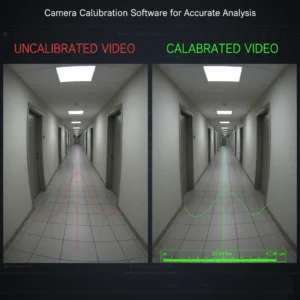Camera Calibration Software for Accurate Analysis
In the world of forensic video analysis, accuracy is everything. A single detail in a piece of video evidence can change the direction of an investigation or the outcome of a trial. But before investigators and analysts can rely on what a video shows, the footage has to be free from distortion, inconsistencies, and technical flaws that might mislead the viewer. That’s where camera calibration software comes into play.
Why Camera Calibration Matters
Every camera, no matter how advanced, introduces some form of distortion into the footage it captures. This could be a wide-angle lens making straight lines appear curved, or a slight misalignment that shifts measurements. For everyday use, most people don’t notice. But in forensic work, those distortions can mean the difference between identifying a suspect correctly or misidentifying them entirely.
Camera calibration solves this problem by teaching the software how the camera “sees” the world. Once calibrated, the footage can be mathematically corrected, ensuring what you see on screen reflects the true dimensions, angles, and distances in the real world. For law enforcement, defense, and forensic professionals, this is the foundation of trustworthy video analysis.
Automatic Calibration with Cognitech
Cognitech has spent decades developing tools designed specifically for forensic professionals. The automatic Camera Calibration module is one of those specialized solutions. Instead of forcing an analyst to manually adjust complex settings, the software provides constant user feedback throughout the calibration process.
The result? Analysts can quickly calibrate a camera and move forward with confidence, knowing that the video evidence they are working with is scientifically reliable. It is not just about saving time, it is about ensuring accuracy that will hold up under scrutiny in the courtroom.

Real-Time Lens Correction
Calibration is only part of the equation. Another common challenge in video analysis is lens distortion. Wide-angle lenses, security cameras, or even body-worn cameras often bend the image, warping straight lines and changing the perspective of a scene.
That is where real-time lens correction makes a huge difference. Cognitech software can remove geometric lens distortion on the fly, meaning analysts can watch an undistorted version of the video in real time. This allows investigators to make immediate observations and accurate measurements without second-guessing what is happening in the footage.
For professionals working under time pressure, whether it is law enforcement responding to an active investigation or defense experts reviewing evidence for court, this feature is a game-changer.
Beyond Calibration: Other Essential Tools
Camera calibration and lens correction are critical, but they are part of a bigger toolkit forensic analysts rely on every day. Cognitech platform integrates multiple modules designed to handle the practical challenges of working with video evidence:
- Digital VCR Playback Control – For analysts still working with legacy media, the VideoActive® protocol allows direct control over supported VCRs, ensuring smooth playback and precise control of tape-based evidence.
- Video Conversion – Not all video files are created equal. Difficult-to-read formats can slow down an investigation.Cognitech lossless conversion ensures files are usable without sacrificing quality or introducing errors.
- Video Playback – Once the footage is calibrated and corrected, analysts can review it in detail with frame-accurate playback or even frame-by-frame analysis. This level of control is vital when every second, or even every millisecond, matters.
Together, these modules create a seamless workflow where analysts do not have to jump between multiple tools or risk losing fidelity in their evidence.
Building Trust in Video Evidence
At the end of the day, forensic video analysis is about trust. Judges, juries, and investigators need to believe that the video they are seeing is an accurate representation of reality. By using camera calibration software combined with real-time lens correction, experts can eliminate the distortions and inconsistencies that often come with raw footage.
For Cognitech, the goal has always been to support professionals in producing evidence that is not only technically sound but also legally defensible. Every feature, from calibration to playback, is designed with that mission in mind.
Final Thoughts
Video is one of the most powerful forms of evidence in today’s investigations. But raw video straight from a camera is not always enough. It needs to be calibrated, corrected, and presented in a way that reflects the truth of the scene.
With Cognitech advanced camera calibration software, combined with real-time lens correction and integrated playback tools, forensic professionals can work with confidence. Accuracy is not just a feature, it is the standard. And in the world of forensic video analysis, that standard can make all the difference.
Talk with experts for Forensic video Processing Software and Forensic Image Processing Software solutions. Contact Cognitech! We hope you enjoyed this Blog! Stay tuned, and don’t miss the coming blogs. You can follow us on Twitter, Facebook, Instagram, Linkedln, or Youtube: we post Community Blogs regularly, so you won’t miss any!
FAQs
- What is camera calibration in forensic video analysis?
Camera calibration is the process of correcting distortions introduced by a camera so that the video reflects true dimensions and angles. It ensures reliable measurements and accuracy in investigations. - Why is real-time lens correction important?
Real-time lens correction removes geometric distortions from footage instantly, allowing investigators to review undistorted video as it plays. This improves accuracy in urgent cases. - How does Cognitech calibration software help analysts?
Cognitech automatic Camera Calibration module provides step-by-step feedback, making calibration fast and accurate. It eliminates guesswork and ensures forensic reliability. - Can calibration and lens correction improve evidence in court?
Yes. Corrected and calibrated video is more scientifically accurate, making it easier to defend in court and ensuring that the evidence holds up under legal scrutiny.
